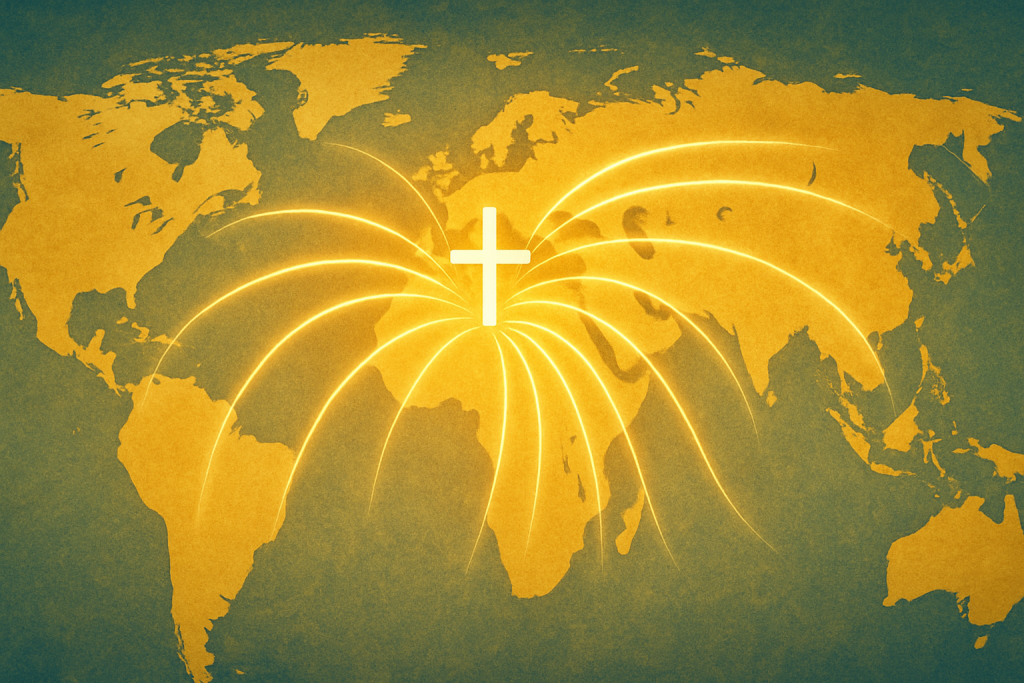
It remains one of the strangest facts of history.
A thirty-something artisan from a provincial backwater, speaking Aramaic in a corner of the Roman Empire, is now at the centre of the world’s most geographically widespread religion. Two thousand years later, his story is still believed – not just by the desperate and uneducated, but by surgeons, software engineers, lawyers, professors and prime ministers.
We can debate for ever whether the miracles happened, whether the tomb was empty, whether God exists at all. But even if you bracket all that out, a hard question stays on the table:
How did this particular faith story become so portable, so durable, and so attractive to intelligent people for so long?
And – just as interesting – why does Christianity grow in some places today and haemorrhage members in others?
I want to suggest that the answer has less to do with miracles, and more to do with four things:
-
- its portability
- its God of love
- its dual appeal to heart and reason
- and the way it behaves sociologically – either as a movement or as an institution.
Christianity’s Secret Weapon: Portability
Most ancient religions came bundled with a package deal: one god, one people, one place, one language.
You worshipped the gods of your tribe, your city, your land. The temple was in that city, the sacrifices at that altar, the prayers in that tongue. This is how religion normally works.
Christianity broke that model.
From the very beginning it said, in effect:
“You don’t need to be Jewish. You don’t need to move to Jerusalem. You don’t need to learn a sacred language. This is for everyone.”
No temple to travel to.
No hierarchical clergy or priesthood – every believer is a priest
No sacred script only the initiated can read.
Just a set of compelling and memorable stories and teachings about Jesus and a small travelling community who claimed that his life, death and (as they saw it) resurrection had changed what it meant to be human.
That made Christianity absurdly portable:
-
- It moved from Aramaic into Greek.
- Then into Latin, Coptic, Syriac, Armenian, Gothic.
- It made the jump into the philosophical worlds of Plato and Stoicism, and then into the legal and administrative world of Rome.
- Today it sits comfortably in English, Swahili, Korean, Portuguese and Tagalog without asking anyone to “become Jewish” first.
If you strip Christianity back to its core, the essentials are strangely easy to translate:
-
- love
- forgiveness
- dignity
- care for the poor
- hope beyond death
- justice
- meaning
- transformation
No sacred mountain. No exclusive caste. No single holy language.
Just a story and a way of life that can, at least in theory, be picked up anywhere.
Whenever Christianity has leaned into this radical portability – no guarantees, no bureaucracy, just small communities trying to live this story in their own culture – it has tended to spread.
Whenever it has wrapped itself in state power, fixed liturgies, heavy buildings and highly controlled hierarchies, after some initial growth, it has tended to stall and then decline.
We can see that empirically now.
A Shockingly Different God
Portability explains how Christianity can move.
It doesn’t yet explain why anyone would actually want it.
Here I think we come to the most explosive claim at the heart of Christian faith:
God loves you. Personally.
We are used to that sentence now. In the ancient world, it was dynamite. All humans are looking for existential meaning and personal acceptance.
The gods of Rome were powerful, but capricious.
The gods of Greek myth were brilliant, but aloof.
The philosophers spoke of a Logos or a First Principle – interesting, but hardly something you would sing hymns to.
Then along come the Christians, saying:
the ultimate reality behind the universe is not raw power, not blind fate, not an impersonal force, but self-giving love – and that this love is somehow focused on you.
Not just: “There is a god.”
But: “You are known and wanted.”
Add to that some other, equally disruptive ideas:
-
- that slaves have dignity,
- that women and children matter,
- that the poor, the stranger, the sick, the disabled are not disposable but precious,
- that every human being, without exception, bears the image of God.
In an empire that threw away unwanted babies, left the sick to die in the street, and treated most people as economically useful units at best, this was not just comforting. It was revolutionary.
You didn’t have to believe in miracles to find this vision of the world compelling. Many still don’t.
Heart and Mind in the Same Story
There is another piece to the puzzle. Christianity did something that very few religions manage to sustain over centuries:
It offered a credible home for both the heart and the mind.
On the heart side, it speaks to:
-
- forgiveness for real guilt
- a path to change when you hate the person you’ve become
- a community that will (at least in theory) walk with you
- the intuition that love and justice somehow matter more than success
- the fear of death and the longing that death is not the end
On the mind side, it offers:
-
- a universe that is ordered and intelligible rather than random
- a moral framework that is more than “my preference vs. yours”
- a coherent story of how humans can be capable of both beauty and horror
- a God-concept that can be, and has been, taken seriously by some of the most demanding intellects in history
Augustine, Aquinas, Pascal, Kierkegaard, Bonhoeffer – whatever you make of their conclusions, these are not gullible people. They were not seduced by a cosy fairy tale. They found in Christianity a way of thinking that was at least big enough to wrestle with reality.
That combination – emotional depth and intellectual seriousness – is rare. It goes some way to explaining why, in every generation, some doctors, lawyers, scientists and philosophers still end up in church despite knowing all the reasons not to.
When Christianity Behaves Like a Religion, It Shrinks
The really uncomfortable part, especially if you belong to an established church, is what happens next.
Over time, the portable, story-driven movement becomes something else:
-
- It builds buildings.
- It develops liturgy and rules.
- It trains a professional clergy.
- It negotiates with states and empires.
- It learns to sit quite comfortably next to imperial power, feudal systems, colonial projects and nationalist dreams – sometimes as their chaplain.
Some of this is inevitable. Human beings organise. Communities need structure. Not every bishop is a villain.
But the sociological pattern is striking:
-
- In much of Europe, the old state-linked churches – Catholic, Anglican, Lutheran, Reformed – are in steep numerical decline.
- They are rich in buildings, history and liturgy; poor in young adults, fresh converts and living energy.
- Many of their most enthusiastic members quietly slip away to small, lay-led, often charismatic communities – or out of the Christian story altogether.
You don’t need supernatural explanations for this.
It is what tends to happen when a movement becomes an institution and then an arm of the state.
The religion that once prided itself on having “no temple, no priesthood, no sacred language” has sometimes become exactly the kind of religion Jesus himself spent so much time arguing with.
And people vote with their feet.
When Christianity Behaves Like a Movement, It Spreads
The picture is very different whenever Christianity sheds the imperial clothing and goes back to something closer to its original form.
We see this in:
-
- house-church networks under communism
- base communities in Latin America
- Pentecostal and independent churches in parts of Africa, Asia and Latin America
- small experimental communities in post-Christian cities in Europe.
What these movements tend to have in common is not a particular theology but a form:
-
- they are locally led,
- often meeting in homes, schools or rented halls rather than cathedrals,
- heavily relational,
- high on participation and experience,
- able to translate the message into local culture without waiting for permission from a distant headquarters.
They may or may not be “charismatic” in the technical sense. Many are. Some aren’t. But they are recognisable cousins of that first generation of Jesus-followers who met in houses, shared meals, argued, prayed, fell out, reconciled and tried to work out what this story meant in Corinth, or Antioch, or Rome.
Where Christianity looks like that, it is often growing – sometimes quietly, sometimes explosively.
Where Christianity looks like a bureaucratic service provider for people who need weddings, funerals and a vague sense of national identity, it is often dying.
Again, you don’t need to believe in God to see the pattern. It’s written in the attendance figures.
So Why This One Story?
None of this “proves” that Christianity is true. That’s a different discussion.
But it does, I think, make sense of why this particular faith story has had such reach:
-
- It told an outrageous story of love in a world ruled by fear.
- It insisted that the most important truths about human life could be carried in a portable story, not locked in a temple or a tribe.
- It managed, at its best moments, to give both the heart and the mind something serious to work with.
- And it has a built-in tendency to break out of its own institutions and reinvent itself as a movement again whenever those institutions become too heavy.
An Aramaic-speaking artisan from a nowhere village should have vanished into the long list of forgotten preachers.
Instead, people all over the world are still arguing about him, still praying to him, still walking away from him in anger, still quietly coming back.
You can explain that purely in sociological and psychological terms, if you like. Or you can, if you are so inclined, wonder whether the “God of love” at the centre of the story has something to do with its refusal to die.
Either way, it is hard to deny that the story is still on the move – and that it travels lightest when it remembers where it began.
“The Christian ideal has not been tried and found wanting; it has been found difficult and left untried.” – G. K. Chesterton
